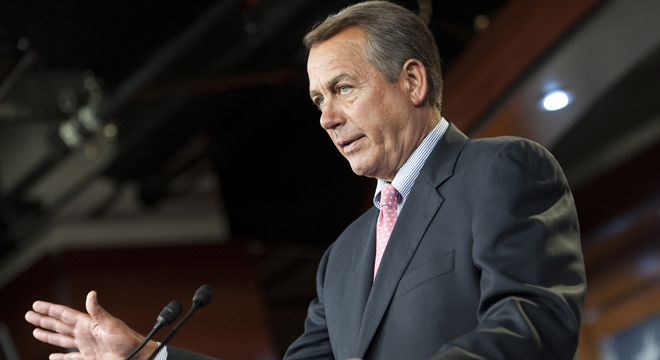In the immediate aftermath of the GOP’s payroll tax debacle, a handful of conservative House Republicans publicly attacked their leaders — particularly Speaker John Boehner (R-OH).
“I am disappointed that our Republican leadership in both the House and Senate chose a course of political expediency rather than standing on conservative principle,” said Rep. Todd Akin (R-MO) in an official statement.
Others appealed to Fox News, where conservatives and Republicans feel more comfortable expounding on party/movement contretemps.
“He’s (Boehner) got a big problem when he comes back,” one anonymous congressman claimed. “He may have a hard time keeping his Speakership after this.”
“We were hung out to dry by our leadership,” said another unnamed member.
The list goes on. But the holidays calmed the backlash, and with a week’s hindsight a consensus of sorts has emerged among party strategists, aides (current and former) and congressional scholars. Not all agree on the question of how well or poorly Boehner handled the situation. But though Boehner’s 2012 won’t be easy, those House conservatives who were seeing blood last week are likely to be disappointed again.
“I don’t think his leadership is going to be taken away from him over the course of the next year,” said Norm Ornstein — a Congress expert at the right-leaning American Enterprise Institute. “But I’m expecting a pretty difficult year ahead for him next year.”
“Going into next year he has to reassert his authority going into the payroll tax debate, and frankly other debates,” said a former senior House aide. “In addition to that he will most likely take a conference-wide stance on the payroll tax fight and will work to fight and win.”
Boehner’s 2012 depends to a huge extent on how much the GOP conference is still spoiling for a fight. If they’re chastened by the horrendous month they had — and thus resigned to ceding the payroll tax issue to the Democrats — then Boehner will have it pretty easy. The payroll tax cut will be extended through the end of the year, and, in a sense, his original judgment will have been vindicated. His members won’t lead the party astray again. But if a substantial number of Republicans return from recess breathing fire, and try once again to use the expiring payroll tax cut to extract massive concessions from Democrats then Boehner and the rest of the GOP are likely in for a politically costly battle.
“When you start with the Republicans rejecting even a dime of taxes on millionaires and you want to take money out of other programs that benefit the middle class or poor people, you’re going to have a tough time doing this,” Ornstein said. “The other part is the Republicans in the House settled on a narrative to justify their action. They said they want a full year payroll tax cut. The fact is a very substantial share of those Rs don’t want anything. They don’t want any payroll tax cut.”
This is correct — and it’s worth recalling that GOP leaders originally solved that problem by tying the payroll tax cut to the Keystone XL oil pipeline. But they already got that — and now that Republicans have built a consensus for a yearlong payroll tax cut almost by accident, it’s unlikely Democrats are going to be willing to concede much of anything to them.
“He tried to throw in this lever, which was this pipeline. Well, they got it,” Ornstein said. “The incentive for Obama to give in more is pretty much zero.”
Despite the unfavorable dynamic for the GOP, most see the worst-case scenario for him as a leadership challenge … in 2013 (assuming the GOP retains its majority in the 2012 elections).
“[Y]ou’re always going to have squeaky wheel members who are never going to be satisfied,” the senior aide said. “And there may be some members who don’t like Boehner who are using it as a way to complain.” However, if the dissent starts creeping beyond that rump in the next couple weeks, “then he’s got a big problem,” the aide says. “[But] I doubt that’s going to happen.”










